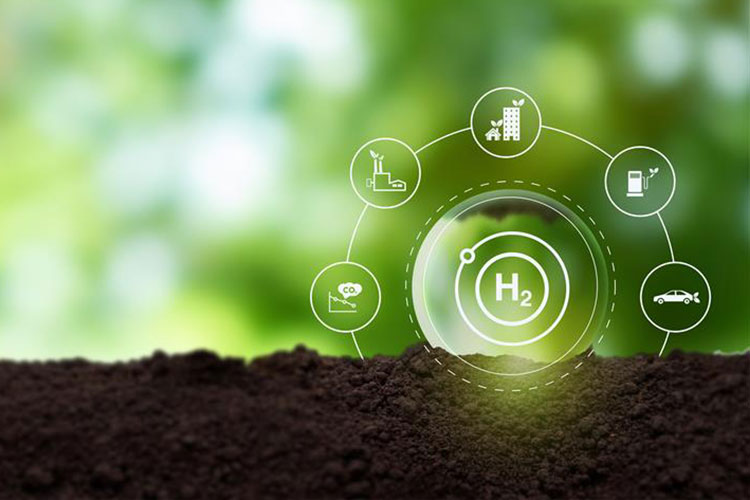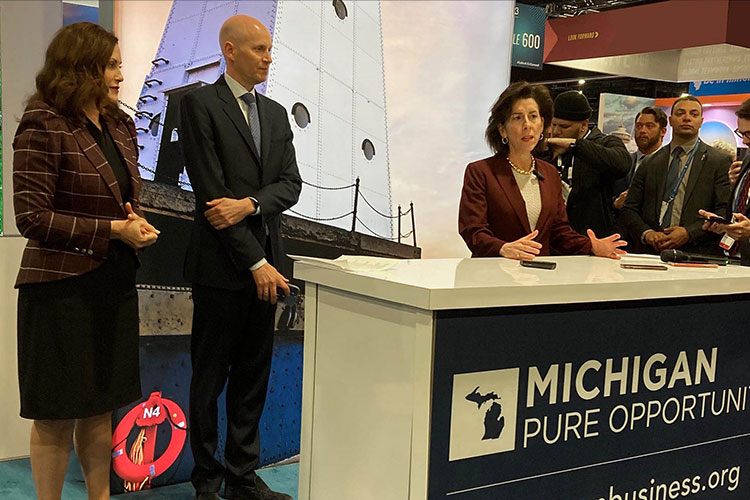
Generation Hydrogen: Michigan’s Clean-Energy Transition
Stefanie Pohl
Thursday, December 7, 2023
With its strong manufacturing heritage and leadership in mobility innovation, Michigan has the opportunity to fuel the future with clean energy

Hydrogen is having a moment. As the most abundant chemical element, hydrogen is poised to be a green gamechanger – moving Michigan away from fossil fuels in the decades to come.
Though hydrogen is the most abundant element in the universe, it is rarely found naturally in its elemental form on Earth. An odorless, colorless, flammable gas, hydrogen is produced either chemically using fossil fuels, thermally via nuclear energy, or through electrolysis.
Currently, 96% of hydrogen produced worldwide is made using natural gas or coal, resulting in relatively high greenhouse gas emissions. The lowest greenhouse gas emissions result from production of hydrogen via electrolysis using renewable energy.
Michigan is already a proven leader in sustainability: in November 2023, the Michigan legislature passed legislation aimed at producing more clean energy in the state . According to an article from The New York Times on the clean energy legislation , the “package of bold laws puts Michigan on a fast track to renewable energy.”
“With passage of these game-changing bills, Michigan will become a national leader on clean energy. These bills will help us make more clean, reliable energy right here in Michigan, creating tens of thousands of good-paying jobs, and lowering utility costs for every Michigander by an average of $145 a year. Getting this done will also reduce our reliance on foreign fuel sources, while protecting our air, water, and public health,” Governor Whitmer said following the passage of clean energy legislation.
The legislation comes a year after Governor Whitmer unveiled the MI Healthy Climate Plan, which outlined a path toward carbon neutrality by 2050. And in September 2023, the state was recognized as the top state in the Midwest for clean energy jobs in the Clean Jobs America report from Environmental Entrepreneurs.
Thanks to groundbreaking legislation, partnerships with neighboring Midwest states and transformational project investments, the elements are coming together to poise Michigan as a leader in a greener, cleaner, hydrogen-fueled future.
Team Midwest
They say it takes a village – and that’s why Michigan is teaming up with its neighbors throughout the Midwest to lead in developing a regional supply chain to support the development, production, distribution and use of hydrogen in trucks and heavy-duty vehicles.
In October 2023, Governor Whitmer announced that a Michigan-backed clean hydrogen hub project, the Midwest Alliance for Clean Hydrogen (MachH2), won up to $1 billion by the U.S. Department of Energy (DOE). The project is anticipated to create 13,600 direct jobs — 12,100 in construction jobs and 1,500 permanent jobs — and was among only seven projects to win this transformational funding.
Michigan’s approach to the DOE funding opportunity was informed by a September 2022 report prepared by the University of Michigan’s Center for Sustainable Systems with funding from the MEDC and university’s Office of the Vice President for Research. The report, “Hydrogen Roadmap for the State of Michigan,” served as a high-level assessment intended to help guide planning and future detailed analysis of a Michigan “hydrogen ecosystem” that encompasses production, delivery, storage and end-use applications. According to the report, Michigan’s main hydrogen-fuel opportunities are in the transportation sector, specifically medium- and heavy-duty trucks on interstate highways.
“It is rewarding and exciting to witness the convergence of the Midwest’s unmatched natural resources, world-class research institutions, and history and know-how of manufacturing to position our region and state as a hub for clean hydrogen innovation,” said Zachary Kolodin, Michigan’s chief infrastructure officer and director of the Michigan Infrastructure Office. “Together, we are harnessing the power of collaboration, drawing on our rich industrial history and forging new paths toward a cleaner, more sustainable future.”
According to Kolodin, the U.S. hydrogen industry could be worth as much as $140 billion per year by 2030, with the potential for up to 700,000 jobs created along the supply chain.
A year prior to receiving DOE funding for MachH2, Michigan announced it would be among seven Midwestern states teaming up to accelerate the development of hydrogen as a clean-energy alternative; the Midwestern Hydrogen Coalition partners Michigan with Illinois, Indiana, Kentucky, Minnesota, Ohio and Wisconsin to collaborate on clean hydrogen development.
Michigan’s Hydrogen Wins
Following the introduction of the MI Healthy Climate Plan, Michigan has attracted a series of hydrogen investments throughout the state that will support its commitment to sustainability advancement.
In May 2023, Governor Whitmer announced that Norwegian hydrogen company Nel Hydrogen would be establishing an automated gigafactory for the production of electrolyzer technology for green hydrogen production in Michigan, generating a total capital investment of up to $400 million and creating more than 500 good-paying clean energy manufacturing jobs. The announcement followed the governor’s first economic investment mission to Norway and Switzerland in January, where she met with European companies including Nel Hydrogen to discusses opportunities for investment in Michigan.

U.S. Secretary of Commerce Gina Raimondo said at the time of the announcement, “from Day One, the Biden Administration has been committed to revitalizing America’s manufacturing industry and combatting climate change by investing in clean energy technologies. [This] announcement … is helping us fulfill both of those goals and building on Governor Whitmer’s work to make Michigan a leader in clean energy.”
Nel Hydrogen chose Michigan for its new automated gigafactory following investments by the DOE’s Hydrogen and Fuel Cell Office around technology advances to transition R&D efforts into gigawatt-scale, real world manufacturing, citing the state’s highly skilled workforce, universities and research institutions and proximity to auto industry leaders.
In September, Nel Hydrogen announced Plymouth Charter Township as the location for its new gigafactory; the new 507,000-square-foot manufacturing facility will be used to manufacture Proton Exchange Membrane and Alkaline hydrogen electrolyzers and is expected to be a full greenfield build constructed specifically for Nel Hydrogen. The project received state funding to help support Michigan’s ongoing leadership in clean energy.
The state continued building on its sustainable project wins when in August, the MSF board approved support for Plastic Omnium New Energies, which plans to establish what is projected to be the country’s largest hydrogen storage manufacturing plant at a facility in Grand Blanc Township – further building on the state’s leadership in clean energy and hydrogen development.
At a second, yet-to-be-determined location in Michigan, Plastic Omnium New Energies will establish a state-of-the-art testing and validation lab to support key aspects of the product’s safety systems. The project received state support thanks to job creation and its emphasis on clean energy R&D and manufacturing.
With the state officially designated as part of a clean energy hub and passing legislation to solidify a commitment toward clean energy, Michigan is positioning itself as not only a sustainability leader, but a pioneer in hydrogen development and adoption.
Learn more about how Michigan leads on hydrogen and the clean-energy transition.
Contact Us
To contact a business development specialist, click here or call 1.888.522.0103.